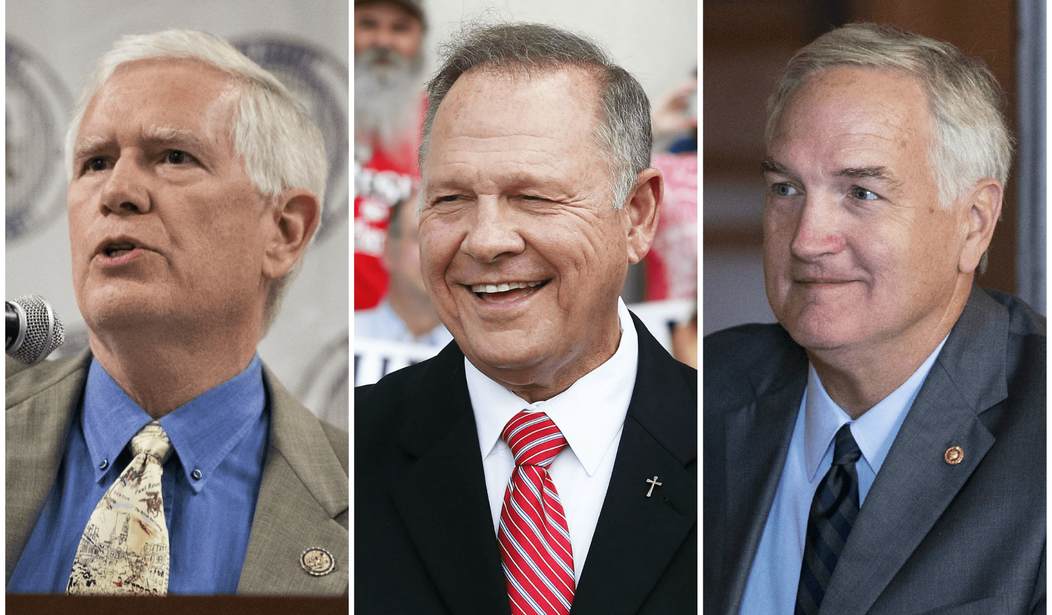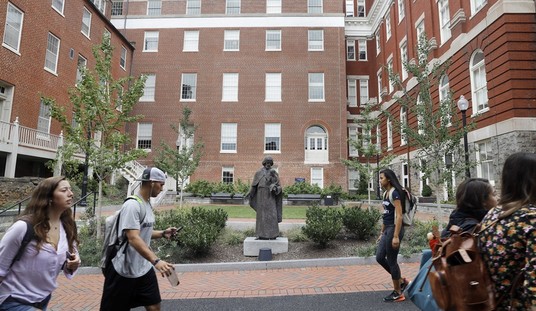On Tuesday, Republicans and Democrats in Alabama cast their votes in a primary election to see who will replace Attorney General Jeff Sessions in the U.S. Senate. On the Right, there is a battle between three key Republican constituencies.
Here are five things to know about the race.
1. Trump’s candidate might not win.
Luther Strange, a former attorney general of Alabama, was appointed to the U.S. Senate to replace Jeff Sessions in February. While incumbency is usually a huge advantage in a primary, that proves less true after an appointment. Strange did not win his current position in an election, but by appointment.
Worse, Strange was appointed by Gov. Robert Bentley, the scandal-plagued medical doctor who resigned from the governorship in disgrace this past April, following a sex scandal with his long-term aide Rebekah Mason.
President Donald Trump has endorsed Strange, but he only did so a few weeks before the voting.
Senator Luther Strange has done a great job representing the people of the Great State of Alabama. He has my complete and total endorsement!
— Donald J. Trump (@realDonaldTrump) August 9, 2017
On Tuesday morning, the president took to Twitter to reiterate his support: “Big day in Alabama. Vote for Luther Strange, he will be great!”
Big day in Alabama. Vote for Luther Strange, he will be great!
— Donald J. Trump (@realDonaldTrump) August 15, 2017
Besides Trump, Strange has many key endorsements, including from the other sitting U.S. senator from Alabama, Richard Shelby. Other supporters include Tom Bradford (president of the National Christian Foundation of Alabama), the National Rifle Association, and National Right to Life.
One of Strange’s most prominent endorsements might hurt him, however. Senate Majority Leader Mitch McConnell endorsed Strange early, partially due to their working relationship in the U.S. Senate. According to a Gallup poll earlier this month, only 40 percent of Republicans view McConnell favorably, down from 49 percent in April.
McConnell’s early endorsement might brand Strange an “establishment” candidate, despite Trump’s support.
2. The evangelical Christian candidate.
The other two Republican candidates with a shot to win — or at least advance to a runoff election — on Tuesday represent two different broad coalitions on the Right.
Roy Moore, former chief justice of the Alabama Supreme Court, leads in the polls, despite fewer endorsements than the other two candidates.
As FiveThirtyEight’s Harry Enten pointed out, evangelical Christians form the backbone of Moore’s base. In a JMC Analytics and Polling survey, Moore enjoyed the most support from self-described evangelical Christians, 38 percent of whom back him. He took a distant third among those who do not describe themselves as evangelical, however, with just 14 percent.
Enten compared Moore to another Republican candidate in recent years: Arkansas Gov. Mike Huckabee in 2008. Huckabee also had a 20-plus-point gap between evangelicals and non-evangelicals in Alabama. Huckabee won that primary with 41 percent of the vote. Also like Huckabee in 2008, Moore enjoys the support of Iowa radio host Steve Deace and actor Chuck Norris.
Another notable endorsement came from Forrest Hood “Fob” James, Jr. James, a former professional football player, served two terms as Alabama’s governor — from 1979 to 1983 as a “born again Democrat,” and from 1995 to 1999 as a Republican.
John Giles, former president of the Christian Coalition of America’s Alabama chapter, and Phil Robertson, a popular Christian reality television star, have also endorsed Moore.
Evangelicals like Moore for his record. Moore was removed from his post as Alabama’s chief justice in 2003 for refusing to remove a monument to the Ten Commandments, and he was again suspended from office in May of last year for failing to enforce the U.S. Supreme Court’s ruling on same-sex marriage in Obergefell v. Hodges (2015).
3. The Tea Party candidate.
If Luther Strange is the Trump candidate and Roy Moore is the evangelical candidate, Rep. Mo Brooks is the Tea Party candidate.
Despite his third-place position in the polls, Brooks holds the longest list of endorsements. Notably, Rep. Mark Meadows (R-N.C.), chairman of the staunchly conservative House Freedom Caucus, has backed Brooks, who himself is a member of that notorious caucus.
Ed Henry, a state representative and chairman of Donald Trump’s Alabama campaign, has also backed Brooks.
A large host of conservative leaders have also lent Brooks their support. Radio host Mark Levin, Fox News host Sean Hannity, radio host Laura Ingraham, and conservative commentator Ann Coulter have all backed him. Also on board are the Courageous Conservatives PAC, the Senate Conservatives Fund, FreedomWorks, Gun Owners of America, the Madison Project, and even the pro-Trump groups Students for Trump and Women Vote Trump.
Elected in the Tea Party wave of 2010, Brooks has been a staunch conservative in Congress. He endorsed Sen. Ted Cruz (R-Texas) in the 2016 primary.
Importantly, Brooks responded heroically in the shooting of Rep. Steve Scalise (R-La.) at a June 14 practice for the Congressional Baseball Game. Brooks used his belt as a tourniquet to help stop the bleeding of a staffer who had been shot in the calf. After the shooting ended, Brooks and Rep. Brad Wenstrup (R-Ohio) assisted Scalise by applying pressure on the wound until he could be evacuated.
Brooks’ name appeared on the assassination list of the shooter, James T. Hodgkinson. Like Scalise, Brooks has been repeatedly attacked by the Southern Poverty Law Center (SPLC), a group that connects conservatives with white supremacists and brands Christian non-profits “hate groups.” SPLC’s activism inspired a terrorist attack in Washington, D.C. in 2012, and James Hodgkinson “liked” the group on Facebook.
After the shooting, Brooks introduced the Congressional Self-Defense Act, allowing lawmakers to carry concealed weapons.
4. The Democrats.
Alabama is a deep red state, and there is very little chance a Democrat will replace Jeff Sessions in the U.S. Senate. Even so, Democrats also have an interesting primary Tuesday.
Doug Jones is a former U.S. attorney with a long slate of endorsements. Both former Vice President Joe Biden and Rep. John Lewis (D-Ga.) have backed him. Lilly Ledbetter, the Alabama activist behind the feminist Lilly Ledbetter Fair Pay Act of 2009, has also backed Jones.
The Alabama Democratic Conference, Common Ground PAC, and two unions — the Communications Workers of America and the Retail, Wholesale and Department Store Union — have also endorsed the former attorney, as have two local newspapers.
Even so, most polls have shown Robert Kennedy, Jr. — a candidate with no political experience and with no relation to the famous Kennedy family — leading in the Democratic primary. Kennedy, a marketing professional, has reportedly refused to discuss his current job, which his LinkedIn profile says he has held for three and a half years. He does have his race as a black man going for him, though.
While there are eight candidates on the Democratic ballot, Kennedy and Jones are the only two with a real chance of winning. Turnout is expected to be very low, as Alabama is a deep red state.
5. The polls: Who’s going to win?
Since Alabama is such a red state, most of the polling has focused on the Republican race. Those polls show Moore, the evangelical candidate, leading Trump’s pick (Strange) by a small margin, with the Tea Party choice Mo Brooks in a distant third.
In the RealClearPolitics polling average, Moore takes 32.2 percent, with Strange closing in at 28.4 percent and Brooks standing back at 17 percent. By FiveThirtyEight’s counting, Moore still leads (33 percent), with Strange further back (26 percent) and Brooks closer to striking distance (18 percent).
Interestingly, it seems the three candidates have different geographical bases, to go with their different ideological backers. As FiveThirtyEight’s Harry Enten pointed out, Moore enjoys support from the southern part of Alabama, especially around Dothan in the southeast. Strange leads in areas around Birmingham, in the central part of the state. Brooks leads in the north, where his congressional district around Huntsville is located.
If no candidate wins an outright majority (50 percent plus one), a runoff election will be held on September 26. A runoff is rather likely on the Republican side, but it is also possible on the Democrat side as well.
The greatest irony would be if Trump’s candidate (Luther Strange) failed to advance to the runoff, since Donald Trump won the state with 62 percent of the vote last November, and a recent Gallup poll found that 55 percent of Alabamians approve of Trump’s performance as president.
Most likely, however, Strange and Moore will advance to the runoff, and one of them will win the general election on December 12. As in other special elections this year, the Democrats may try to win, but they are at a heavy disadvantage.









Join the conversation as a VIP Member